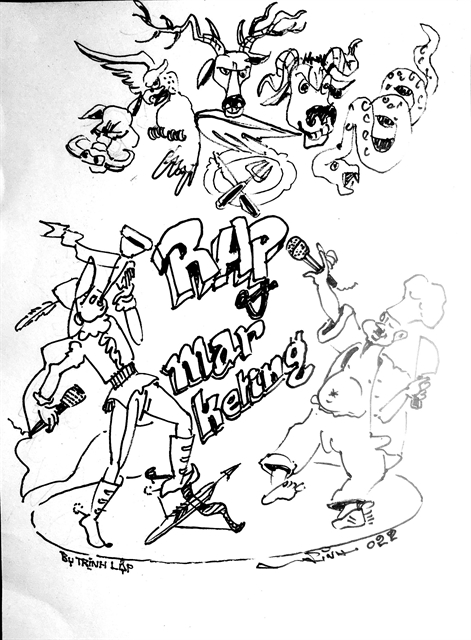
Illustration by Trịnh Lập
An Phương
Music marketing has been on the rise with the introduction of various music videos in collaboration between artists and brands during Tết (Lunar New Year) holiday.
“It seems easier to find branded music compared to original songs these days. Tết is definitely ‘the time’ to launch music marketing campaigns,” Thanh Thảo, 28, a local clothing brand owner, told Việt Nam News.
Many of my close friends, some of whom work in advertising, have been keen to talk about the subject.
“Music marketing is an activity that uses music to help reach listeners and target potential customers, thereby contributing to increasing brand awareness of certain messages or products,” said Thu Anh, 30, who works at a local advertising agency in HCM City.
With its potential to go viral, Thu Anh said music marketing, especially via the form of music videos, had been embraced by various brands in an effort to bring their products closer to consumers. Since social media users can easily memorise, dance or do skits along to the music, it helps further amplify the brand’s message.
"TikTok is the platform that many brands aim for at the moment," she added.
Quang Thắng, 30, a bank worker has similar thoughts. “Even though I’m just a casual Internet user without much interest in local music, branded music videos are so catchy that I sometimes can’t help but mumble the lyrics,” Thắng said.
Local artists have done a wonderful job in creating viral music videos with hidden branded messages. Long gone are the times when product placement was so obvious and unappealing in digital content. Times have moved on.
“The way we do marketing has drastically changed. Entertainment values must be emphasised in order to leave positive impressions among viewers, and brands have been more open to artists’ creativity. Everyone is trying to have a great time,” Thu Anh said.
Some prominent examples in the past few years include the song Em Bé from Amee and Karik for Beamin with 48 million views on YouTube, Đi Để Trở Về from Soobin Hoàng Sơn for Biti’s Hunter with 86 million views, and Đi Về Nhà from Đen Vâu and JustaTee for Honda with 115 million views. The reach is huge.
Most branded music videos for the Tết season depict simple family stories and people’s efforts to head back home for the special occasion.
These stories never get old as they reflect people’s most basic need to reunite with their families. It’s exciting to see what will come next. For the past two years, branded music content for Tết has been something that I have looked forward to.
“Perhaps it was TV programmes Rap Việt and King of Rap that successfully brought underground music to a whole new level. I’ve never seen any music genre thriving on all social media platforms and dominating the Tết music scene as rap did in 2021,” Thắng said.
It would be hard to even count how many rappers from the two famous shows appeared in branded Tết music videos last year. Music marketing was clearly having a huge impact on consumers, and the music they listened to and bought.
This year, I am particularly in love with Mang Tiền Về Cho Mẹ, a collaboration between rapper Đen Vâu and singer Nguyên Hà for Honda Việt Nam.
Embracing the old tale of bringing money back home to beloved moms after a year of hard work, Đen Vâu has been able to convey the love every mom has for her son, and the hope that their children become kind-hearted and able to take good care of themselves. And, of course, on every child’s ride home, Honda motorcycles are seen as an inseparable companion.
“I find Đen Vâu’s collaborations with brands very pleasant to watch. The product placement is subtle and appears towards the end of the video, making me feel like I'm watching a normal MV and I appreciate the content on a deeper level,” Thảo said.
Currently, this video has gained 34 million views on YouTube after just two weeks.
According to several local artists, making music videos with brands is challenging and sometimes more difficult compared to making solo pieces.
Recently on “Have A Sip”, a show by Vietcetera, rapper JustaTee said he hoped social media users would view branded music videos as “normal” and respect artists’ hard work and effort.
“I totally understand viewers’ discomfort when watching branded content but I would like to prove that my branded music is no different from my normal songs. In fact, I spend more time and effort on making branded music compared to normal stuff,” he said.
In my view, there’s nothing wrong with branded music. Though I had that initial feeling of unease when watching it for the first time, I could totally feel artists and their teams’ effort in making social media users enjoy the final product.
In fact, I have gradually accepted the fact that regardless of Tết, branded music will be “the new thing” in today’s music and marketing scene.
“It’s more about who executes the branded message better! I’ve seen some interesting music videos recently and been quite surprised at how low-key brands use music to engage with their users,” Thảo said. VNS
OVietnam